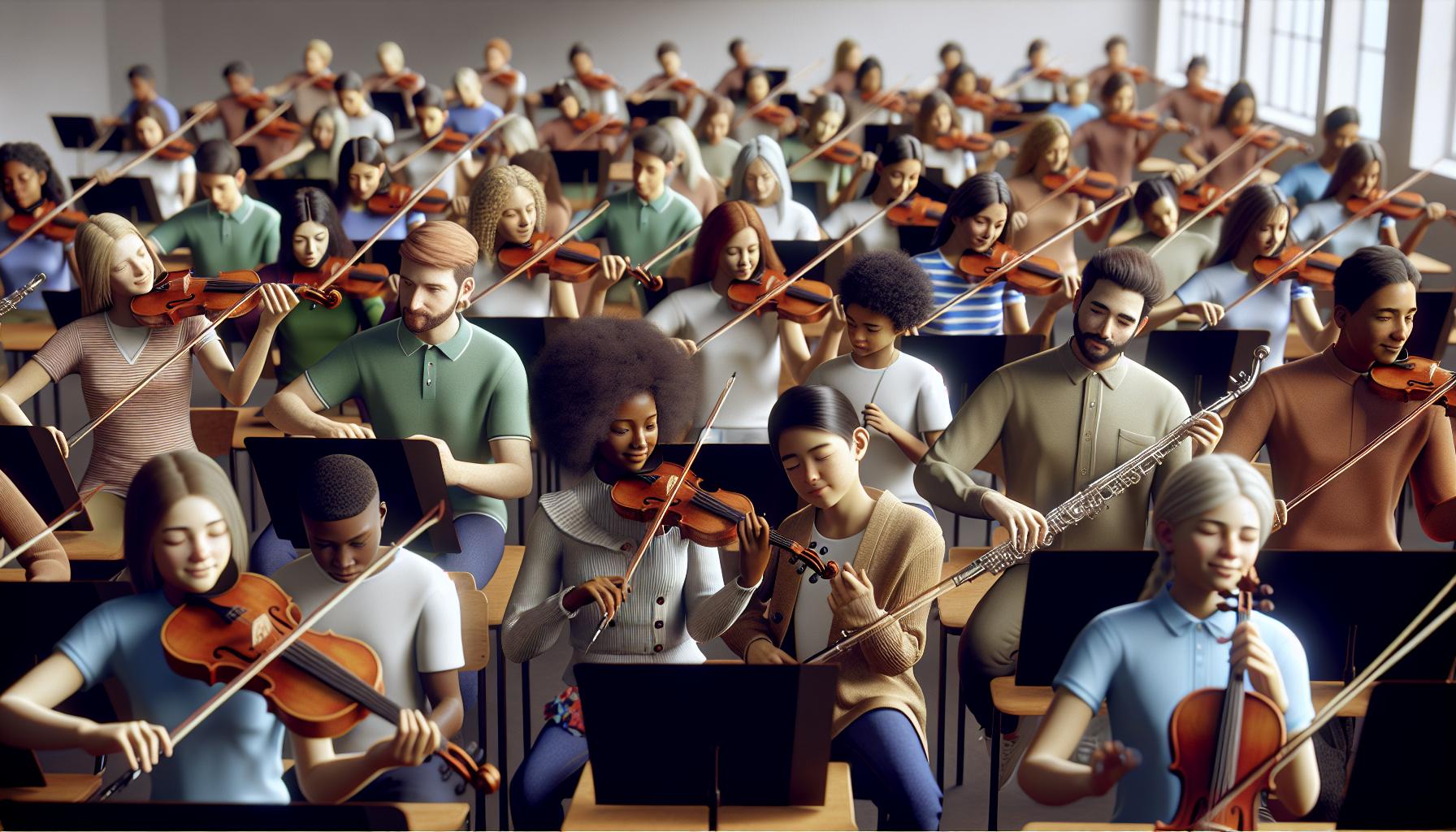Music education plays a crucial role in shaping well-rounded individuals. It’s not just about learning to play an instrument or sing; it’s about fostering creativity, discipline, and critical thinking. In a world that increasingly values innovation, music education equips students with essential skills that extend beyond the classroom.
Moreover, engaging with music enhances cognitive abilities and emotional intelligence. Studies show that students involved in music programs often excel academically and socially. They learn teamwork through collaboration in ensembles and develop perseverance by mastering challenging pieces. As the importance of holistic education grows, understanding the benefits of music education becomes vital for parents, educators, and policymakers alike.
Key Takeaways
- Holistic Development: Music education fosters creativity, discipline, and critical thinking, which are essential for personal and academic success.
- Cognitive Enhancements: Participation in music improves cognitive abilities, resulting in better performance in subjects like math and reading.
- Emotional Intelligence: Engaging in music helps students develop emotional regulation, empathy, and resilience, promoting overall emotional well-being.
- Social Skills and Teamwork: Collaborative music activities enhance communication, teamwork, and the ability to build strong relationships with peers.
- Academic Performance: Music students often achieve higher scores on standardized tests due to improved learning skills and cognitive functioning.
- Lifelong Opportunities: Music education opens doors to various career paths and instills valuable skills like creativity, collaboration, and perseverance applicable across multiple fields.
Why Music Education Is Important
Music education plays a crucial role in personal development, extending its influence beyond mere artistic skills. It cultivates essential competencies that contribute to overall academic success and personal growth.
Cognitive Benefits
Music education enhances cognitive abilities significantly. Studies show that students engaged in music programs perform better in subjects such as math and reading due to improved memory and concentration skills. For instance, learning to read musical notation involves pattern recognition, which parallels skills used in mathematical problem-solving. In addition, research from the Journal of Educational Psychology indicates that musical training positively correlates with better performance on standardized tests. These cognitive gains result from the complex mental processes involved in music comprehension and creation.
Emotional Development
Music education also fosters emotional intelligence. Participation in music enhances self-esteem and develops empathy, as students often express emotions through their performances. According to studies, children involved in music tend to exhibit greater emotional regulation and resilience when facing challenges. Group activities, such as band or choir, promote teamwork and social skills, helping students build lasting relationships. Engaging with music allows individuals to process feelings, contributing to overall emotional well-being and a better understanding of oneself and others.
Social Skills and Teamwork

Music education significantly enhances social skills and teamwork through group involvement in various musical activities. Collaborating with peers fosters communication and camaraderie, essential traits in both personal and professional realms.
Collaboration in Music
Collaboration in music occurs during practices, performances, and group lessons. Students learn to coordinate efforts on shared goals, whether in a band, orchestra, or choir. They develop crucial skills like listening, compromise, and respect for others’ ideas. For instance, a choir member must adjust their volume and timing to blend harmoniously with others, teaching them the importance of unity in achieving a common objective.
Building Relationships
Building relationships is a natural outcome of music education. Students often form connections with peers who share similar interests, promoting a sense of belonging. Engaging in music programs creates opportunities for social interactions that strengthen trust and support among participants. Through these relationships, students gain social confidence and learn to navigate diverse social settings, establishing lifelong friendships and networks that extend beyond school.
Academic Enhancement

Music education significantly enhances students’ academic performance. Its influence extends to various learning skills and standardized assessments, demonstrating its crucial role in a well-rounded education.
Improved Learning Skills
Music education fosters improved learning skills, empowering students to concentrate more effectively and retain information. Engaging with music requires active listening, which sharpens focus and attention to detail. Students develop critical thinking and problem-solving skills through music theory and composition, encouraging analytical thought processes. Additionally, music promotes memory enhancement; students frequently recall intricate patterns and sequences, which translates to better performance in subjects that demand similar cognitive abilities.
Impact on Standardized Tests
Research consistently shows that students who participate in music programs score higher on standardized tests. A study found that students involved in music education outperformed peers in reading and math. The rigorous cognitive activities associated with music training, such as pattern recognition and coordination, improve overall brain function. These skills correlate with test performance, establishing a clear link between musical training and academic achievement. By prioritizing music education, schools can provide students with a significant advantage in their academic endeavors.
Lifelong Skills and Opportunities

Music education fosters a wide range of lifelong skills and opens valuable opportunities for personal and professional growth.
Creativity and Expression
Creativity and self-expression thrive through music education. Students learn to explore their artistic abilities, express their emotions, and communicate ideas effectively. Participation in music programs enhances critical thinking as students engage with diverse musical styles and techniques. Experiencing different genres fosters appreciation for cultural diversity, enriching students’ understanding of the world. The collaborative aspect of creating and performing music encourages confidence in sharing one’s artistic voice with others.
Career Paths in Music
Career paths in music vary greatly, offering numerous opportunities for those who pursue them. Music education equips students with skills relevant not just in music but in various fields. Potential careers include roles as professional musicians, music educators, music therapists, sound engineers, and event coordinators. Music-related careers often require a blend of creativity, technical skill, and teamwork, making foundational music education critical. Furthermore, skills gained through music education—such as discipline, perseverance, and collaboration—are invaluable assets in any professional area.
Music Education Plays A Vital Role In Shaping Well-Rounded Individuals
Music education plays a vital role in shaping well-rounded individuals. It cultivates essential skills that extend far beyond the classroom. By engaging in music programs students enhance their cognitive abilities and emotional intelligence while developing social skills and teamwork.
The benefits of music education are profound and lasting. As students explore their creativity and learn to express themselves, they build a strong foundation for future success. Prioritizing music education not only enriches their lives but also prepares them for various career paths. Investing in music education is investing in a brighter future for students and society as a whole.